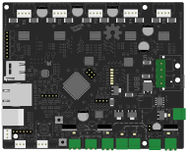Smoothieboard
Revision as of 20:32, 9 November 2014 by Arthurwolf (talk | contribs)
SmoothieBoard
Release status: Working
| Description | 32bits powerful and simple to configure electronics
|
| License | |
| Author | |
| Contributors | |
| Based-on | |
| Categories | |
| CAD Models | |
| External Link |
Smoothieboard is a controller board for Reprap 3D printers. It is a descendant of other Reprap electronics like RAMPS, RAMBO and Melzi.
The main design change from older boards that is uses a more powerful ( ARM 32bits ) Cortex-M3 Microcontroller.
The board is named Smoothieboard, and the firmware that runs on it is called Smoothie.
The Smoothie project's main design goals are :
- Ease of use and configuration
- High performance ( faster speeds, smoother motion, thus the name )
- Also works for laser cutters and CNC mills
- Ethernet ( web interface ) support
- Easy to contribute to, feature-rich
- Strong documentation effort ( beginner-friendly, coherent, up to date documentation )
Features
- Smoothieboard
- ARM-Cortex M3 LPC1769 ( 120Mhz, 64kB RAM, 512kB Flash ) Microcontroller
- USB2 interface
- Ethernet interface
- MicroSD card slot ( comes with a 4GB SD card, filled with documentation and host/slicing software packages )
- 5 stepper motor drivers ( A4982, for stepper motors rated up to 2 Amperes ), well cooled on-board, 1/16 microstepping
- Digital current control ( no need to use a screwdriver to set a potentiometer for current setting )
- 3 ZXMN4A06 ( 5A, up to 24V ) small mosfets for hotends and fans
- 3 AOT240L ( 12A, up to 24V ) big mosfets for hotends, fans and heated beds
- 12 to 24V power input
- Optional Voltage Regulator so the board can run without a host computer
- 4 Thermistor inputs ( 12bit ADC ) for thermistors
- 6 Endstop inputs
- Extensions : SPI, I2C, PWM, DAC, free GPIOs
- Un-pluggable screw terminal connectors for easy wiring
- Everything broken out for easy hacking and inventing of new things
- Open-Source Hardware, community developped
- Smoothie firmware
- Designed to take advantage of Smoothieboard's higher processing power
- Motion control code was initially a port of the popular GRBL firmware
- Supports all features found in Reprap firmwares
- Compatible with the normal Reprap ecosystem ( G-code flavour ), making it compatible with the common Reprap Hosts ( Pronterface, Octoprint etc )
- Easy configuration using a simple configuration file on the SD card ( no compiling/flashing required )
- Serial interface over USB
- Mass storage ( exposes the SD card content allowing for easy access to the configuration file ) over USB ( simultaneous with the Serial interface )
- Ethernet support exposing Telnet, HTTP ( Web interface ) and SFTP interfaces.
- High step rate ( 120khz ) for higher movement speed or high microstepping
- Many improvements to the motion control code allowing to use the higher processing power for more correct and smoother motion control
- Longer and faster look-ahead for acceleration
- Supports alternative arm solutions beyond cartesian : Linear delta ( Rostock ), H-Bot/CoreXY, Morgan Scara, Feather
- Also supports laser cutting, CNC milling, paste extrusion
- Support for arbitrary number of extruders and hotends
- Support for arbritrary number of "switches" ( configurable G-code controlled inputs or outputs )
- Touchprobe support ( autolevelling and auto-calibration )
- PID control and PID auto-tuning
- Support for several common "panel" controllers
- Easy firmware upgrade via the SD card
- Modular and well commented code
- Simple to contribute to ( modular design means you only have to add/edit one file to add a feature )
- Integrated debugger support ( DFU for flashing and MRI for GDB )
- Wiki-based documentation with a large coverage, and an emphasis on being beginner-friendly
- Community reaching outside of 3D printing resulting in additional features and code/documentation contributions
